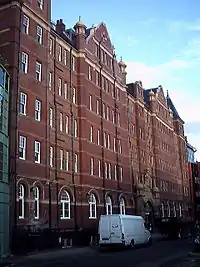Arlington House (London)
Arlington House is a hostel for homeless men in Camden Town, London that opened in 1905.

History
Arlington House is the last and largest of the Rowton Houses to be built and is the only one to remain in use as a hostel. For its first 80 years since opening in 1905, it had a capacity for 1,200 tenants, later reduced to 400. It was refurbished in 2009 and opened as a conference centre, plus accommodation for 150 homeless, vulnerable, and low-income tenants. It has been described as the biggest homeless hostel in Europe, and home to more Irish men than any other building outside Ireland.[1]
Arlington House was taken over by Camden London Borough Council in the 1980s, but was subsequently privatised and later given without payment to One Housing Group (OHG) by the Novas Scarman group to ensure that building works were completed. As of 2016 the building continued to be owned and managed by One Housing Group, having undergone major government-funded refurbishment, and reopened in 2010.[2] There was much criticism around this matter; see "What the press says", below.
One Housing Group issued a press release on 16 December 2009 in which they say that they would work with social enterprise partners City Dining, SPACE and Broadway. According to the press release, City Dining was proposing to provide catering for residents and staff at Arlington and training for a group of customers, with the aim of offering them permanent positions. SPACE was proposing to run an art studio and creative space for residents, and eventually to develop opportunities for creative and media training. Broadway were in discussions to deliver an employment and training service for residents, and setting up a Business Centre providing training, conference and business support facilities.[3]
In a 4 March 2010 press release OHG said that the refurbished Arlington House would be a modern building with 95 high-quality units for homeless people, 35 sub-market-rent flats, and 3,000 m2 of "social economy and training" space. The building was to reopen after refurbishment with government investment.[4]
Arlington House was opened after completion of major rebuilding by Mayor of London Boris Johnson on 10 June 2010.[5] In 2016 it called itself "Arlington Conference Centre, part of One Housing Group", described as "a multipurpose hub of commercial and support services", having also "95 residential rooms for homeless and vulnerable adults and 44 studio flats for low-income workers as well as the Conference Centre. Arlington also has a range of social economy partners who rent office spaces and artist studios."[6] After reopening it was visited by several well-known people, including Tracey Emin, Iain Duncan Smith, Nick Clegg, and Prince Charles.[7][8]
The Aisling Project was involved with the Irish Tenants Association of Arlington House,[9] who constituted about a third of the residents before refurbishment. These tenants were generally older than the others and had lived in the hostel for longer.
Famous residents
George Orwell lived in one of the Rowton Houses and wrote about the experience in Down and Out in Paris and London, his semi-autobiographical account of living in poverty in both cities. Brendan Behan also lived in Arlington House.[10]
In popular culture
The Pogues reference Arlington House in the song Transmetropolitan by Shane MacGowan from their album 1984 Red Roses for Me.
"Arlington House - address, no fixed abode" is the first line of the 1984 top 20 song "One Better Day" by Camden pop group Madness. The song is about homeless people, and Arlington House features in the accompanying video.[11]
Irish-born photographer Deirdre O'Callaghan spent four years photographing the men of Arlington House for a personal photographic project, and her first book, Hide That Can, resulted. Published in 2002 by Trolley in London, it was awarded Book of the Year by both the International Centre of Photography in New York and Les Rencontres de la Photographie in Arles.
"Men of Arlington" is a 2011 documentary film directed by Enda Hughes that portrays the tragedies and triumphs of the emigrant Irish in London. [12]
References
- "About the Aisling Return To Ireland Project". Aisling.org. Retrieved 4 June 2016.
- One Housing Group takes ownership of Arlington House and Dean Street hostels, 16 June 2009 Archived 19 June 2009 at the Wayback Machine
- One Housing Group confirms key partners for Arlington
- OHG press release, 4 March 2010
- The Mayor of London opens Arlington House, 10 June 2010 Archived 13 March 2011 at the Wayback Machine
- 2016 brochure of "Arlington Conference Centre, part of One Housing Group"
- "Prince of Wales calls on business to help the homeless back to work". The Daily Telegraph. 16 February 2011. Retrieved 4 June 2016.
- Camden new Journal: Royal snub for Arlington House visit? Mayor's Prince invite 'lost' Archived 8 July 2011 at the Wayback Machine
- "Irish Tenants Association of Arlington House, 2006 (archived)". Archived from the original on 27 September 2007. Retrieved 29 August 2007.
- A tribute to The Lost People of Arlington House, The National Archives, London 2004
- Madness - One Better Day (video)
- "UK Premiere – Men of Arlington, Tricycle Theatre Kilburn, Sept 25th". Aisling.org. 23 August 2011. Retrieved 4 June 2016.
External links
What the press says
- http://www.irishpost.co.uk/tabId/279/itemId/426/Hostel-renovation-works-bring-a-chill-for-resident.aspx%5B%5D
- https://web.archive.org/web/20160409204159/http://www.insidehousing.co.uk/ihstory.aspx?storycode=6501754
- https://web.archive.org/web/20120723020528/http://www.insidehousing.co.uk/ihstory.aspx?storycode=6502567
- https://web.archive.org/web/20160407171921/http://www.insidehousing.co.uk/ihstory.aspx?storycode=6501663
- https://web.archive.org/web/20120723020634/http://www.insidehousing.co.uk/ihstory.aspx?storycode=6501620
- https://web.archive.org/web/20120723020703/http://www.insidehousing.co.uk/ihstory.aspx?storycode=6502139
- https://web.archive.org/web/20120723020717/http://www.insidehousing.co.uk/ihstory.aspx?storycode=6502000
- http://www.thecnj.com/camden/2008/091808/news091808_04.html?headline=Fears_over_future_of_Arlington_House
- http://www.thecnj.com/camden/2008/120408/news120408_07.html
- http://www.thecnj.com/camden/2008/110608/news110608_02.html?headline=Investigators_pore_over_books_of_charity_behind_%C2%A322m_revamp_at_hostel